I ll Make You Queen Again Princess Diana
The purple women take been portrayed as having a frosty relationship, but how did Queen Elizabeth and Princess Diana really feel about each other? Here's what nosotros know.
Queen Elizabeth Ii and her girl-in-law, Princess Diana, were more alike than y'all may realize: They both gave their lives to public service, they were strong in their ain ways, and both were devoted to their families and subjects alike. But Queen Elizabeth and Princess Diana were also very unlike. The Queen is silent and traditional; Diana was mod and outspoken.
Lady Diana Spencer, an aristocrat with many links to the royal family tree, married the eldest son of Queen Elizabeth II, Prince Charles, in July 1981. They had two sons, Princes William and Harry, who are Queen Elizabeth'southward grandchildren. Later several publicly tumultuous years in their spousal relationship, Charles and Diana divorced in 1996, and Princess Diana died the following yr.
What was the human relationship between Queen Elizabeth and Princess Diana really like, though? Much of the information that'southward been used to form the narrative is a bit lopsided. "There's a fundamental asymmetry in what we know about this relationship," says Arianne Chernock, an associate professor of history at Boston Academy focusing on modernistic British history and the monarchy. "Diana perhaps told besides much—she disclosed quite a bit virtually her life and her private feelings and emotions to the press. The Queen throughout her reign has had a very different, much more than conscientious, choreographed approach. Then we don't know what the Queen thought of the relationship. In a way, Diana gets to narrate the story for us." And although much hearsay has been written about how the two royals felt about each other, this is what we know from the women themselves nearly their complicated relationship.
When did Queen Elizabeth and Princess Diana run across?
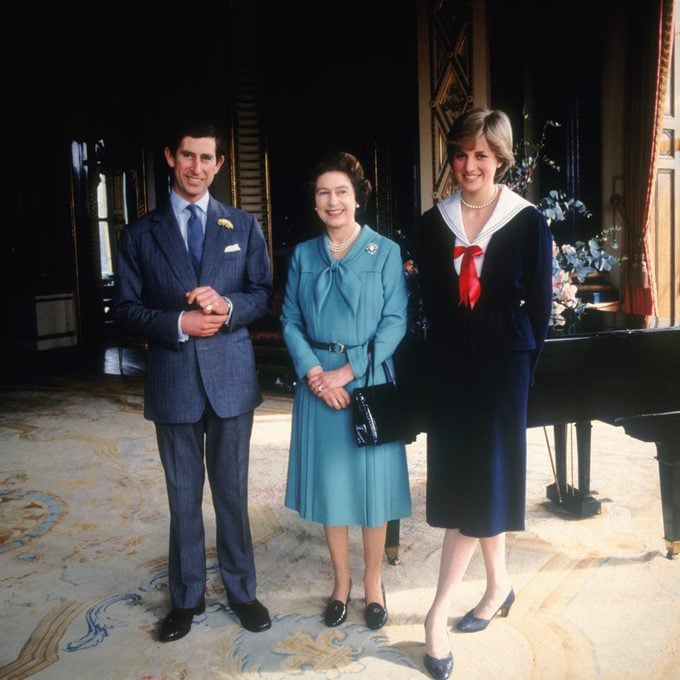
The Queen had known Diana Spencer—or at least known of her—for most of the younger adult female's life. "The Spencers were a prominent family with close majestic ties," Chernock says. Diana's father was an equerry, or personal bellboy, to the Queen'due south father, King George Half dozen, so to the Queen herself; her grandmother was a lady-in-waiting to Elizabeth's mother. Queen Elizabeth and Prince Philip attended Diana'southward parents' wedding, and the Queen is the godmother of Diana'due south younger brother, Charles.
Princess Diana was born and spent her childhood at Park House, on the grounds of the royal manor in Sandringham, Norfolk. The majestic family unit's official website notes that, equally neighbors, the families had known each other for many years. "In fact, Diana's older sister [Lady Sarah] briefly dated Prince Charles before he met Diana," Chernock says.
Every bit her royal biography notes, Diana first encountered Prince Charles in 1977. He'd been invited to the Spencer estate at Althorp, where the family unit had moved after Diana's male parent became Earl Spencer in 1975.
When they began dating, a marriage between Charles and Diana was hardly a given. So when was Diana introduced to the Queen every bit a potential partner for Charles? "The nearly sustained early interaction with the majestic family came when she was invited to [regal Scottish country estate] Balmoral," Chernock says. Viewers of Netflix's The Crown will remember the 1980 meeting as the infamous "Balmoral examination."
The Queen thought Diana quite suitable for Charles. "She was very much a hit with the purple family—they really warmed to her," Chernock says. "Diana worked very, very hard to ingratiate herself and to model what she thought beingness a princess would entail, and she did information technology very successfully."
Merely this success would later come to backfire on Diana. "In hindsight, many would argue that she was not her accurate cocky during that visit, so she was more performing a role that she aspired to as opposed to being herself," Chernock says. "She was working very hard to fit in. She was a urban center girl, and she pretended to love the country. She went out shooting. She did all of the things that she was supposed to exercise only that she really did not enjoy."
What was the human relationship betwixt Queen Elizabeth and Princess Diana similar?
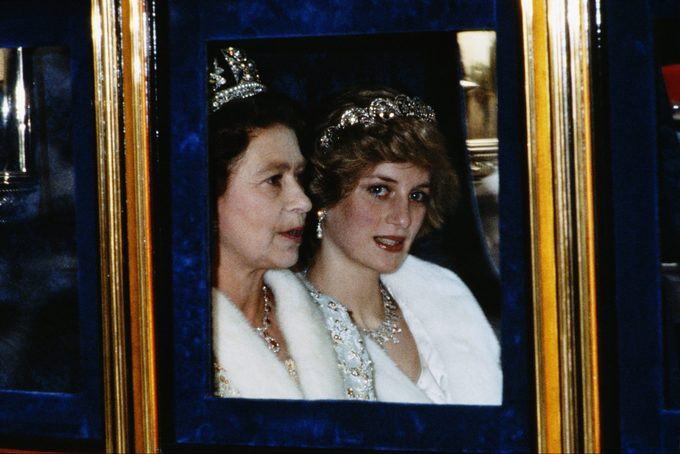
At starting time, everything went smoothly between the Queen and Diana. "We practice know that both she and Philip thought that Diana, based on that experience in Scotland, was very acceptable," Chernock says. "They encouraged this union."
Although they were not exactly shut, the Queen canonical of Charles's pick—or rather, she canonical of the woman she believed Diana to exist. If she hadn't given her stamp of approval, the relationship wouldn't take moved forward. "The Queen has never left a recorded impression," Chernock says. "She's very tight-lipped. And so nosotros don't know. We can't admission her diaries or her private thoughts. Nosotros can wait at her deportment and her behaviors; those are the clues nosotros have."
Equally for Diana, she may have started to get the sense that she bit off more than she could chew. "I think afterward her initial romance in Scotland, she began to realize but how catchy the royal family unit would exist and how ill-prepared she was to really be a full-fledged member of the family," Chernock says.
How did Queen Elizabeth feel about Diana's engagement to Prince Charles?
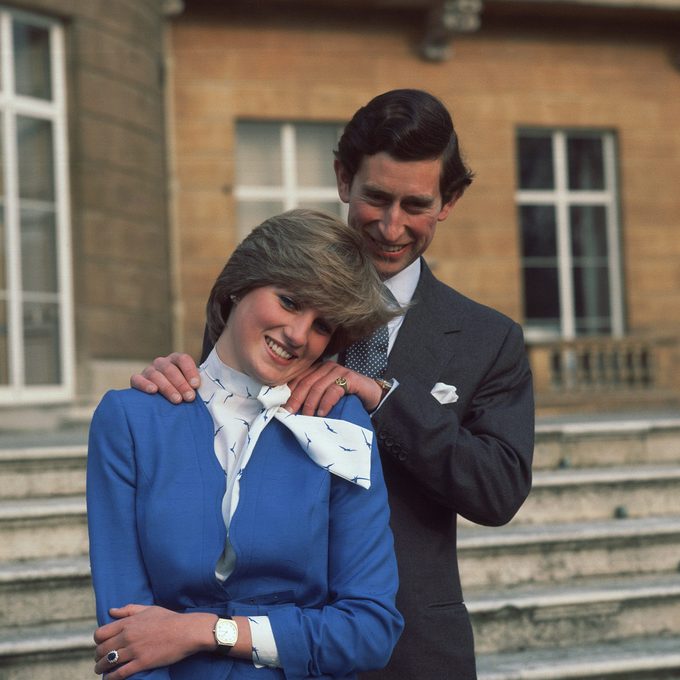
The Queen had a sense that Diana could handle purple life, and not just because of her success at Balmoral. Boosted proof came, ironically, in the way Diana was able to weather the tempest of press and photographers who soon descended upon her, according to a 1981 Time magazine article announcing her engagement. The Queen had begun pressing Charles to propose, due in part to all the media attention, giving him an ultimatum to marry Diana by the summertime of 1981 or not at all. "The idea of this romance going on for some other year is intolerable to anybody concerned," the Queen said, co-ordinate to Time. And when the public announcement happened, Elizabeth was "beaming."
But things would take a darker turn for Diana as she moved into the royal apartments at Buckingham Palace in preparation for the wedding. "Diana was wanting more than guidance and felt that the Queen could have offered that to her," Chernock says. "So it's a fishbowl kind of experience, very few people on the within, and I think Diana did depict her experience as a profoundly alone one and wished that especially women in the royal family had been more accessible, more available to her."
The Queen, though, might have seen things differently. "She may recall she was very accessible—she may call back she did what she could, given her role and given her commitments and constraints," Chernock says. "Again, Diana gets to tell the story about the Queen."
Nosotros practise have a glimpse of the Queen'due south feelings on the matter. According to imperial expert Ingrid Seward'southward 2002 volumeThe Queen & Di, in March 1981, Elizabeth wrote a letter of the alphabet to a friend in which she said, "I trust that Diana will find living here less of a burden than is expected."
Of grade, that'south not what happened—at to the lowest degree from Diana's signal of view. "She described the royal family as cold, heartless, and unfeeling; unsympathetic," Chernock says. "I don't think she was e'er singling out the Queen specifically, simply certainly that was how she framed her encounters with the family, the business firm." (The firm is an informal title for the establishment of the monarchy, of which the Queen is the head.)
What happened between Queen Elizabeth and Princess Diana later the nuptials?
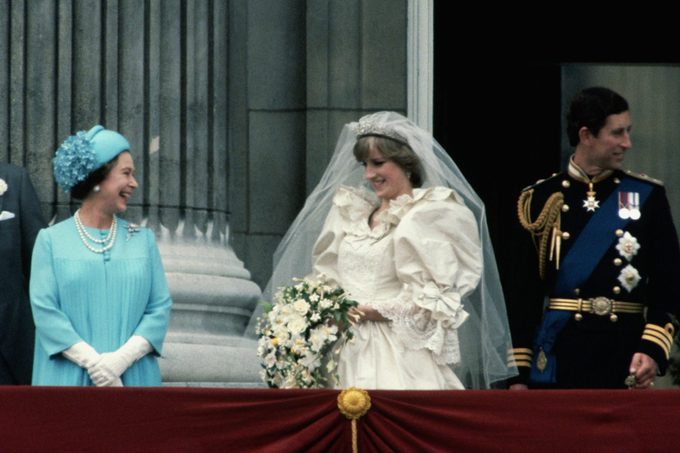
Later on Charles and Diana's wedding on July 29, 1981, the Queen began to entrust Diana with imperial responsibilities, showing that she had confidence in the new Princess's power to carry out her official duties. Diana's first solo task was to correspond the royal family at the funeral of Princess Grace of Monaco, which the Queen allowed her to have on fifty-fifty though Charles didn't recollect it was a good idea. According to Andrew Morton's 1992 book, Diana: Her True Story—In Her Own Words, the Princess recalled, "I went to the Queen, and I said, 'You know, I'd like to practice this,' and she said, 'I don't see why not. If yous want to do this, you can.'"
The success at that result led to many more than, and even the Queen could see that the Princess had a way with people that could buoy the monarchy's popularity. "She was an nugget, to a point, until she stole the show," Chernock says. "Function of the challenge, though, for the Queen and especially for Charles, was that Diana, she shined and then brightly that she really—not necessary intentionally—eclipsed those around her."
Diana's star power affected Charles the nigh when they toured, but it impacted Elizabeth as well. "In that location was a bit of, I suspect, tension there because she's the Queen," Chernock says. "There was a complicated footling dance they probably had to play with each other."
How did the women'south relationship change as the imperial union declined?
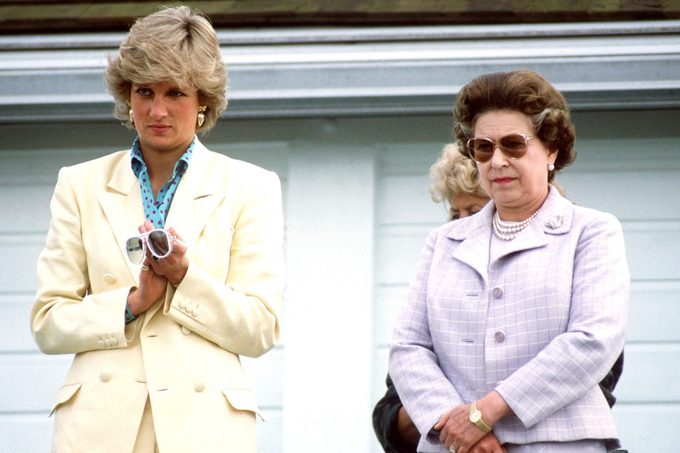
Prince Charles and Princess Diana were mismatched from the outset, and with their marriage crumbling, the relationship between Queen Elizabeth and Princess Diana was also headed for the rocks.
In tapes from 1993, which were made public in 2004 and rereleased with the 2017 documentary,Diana: In Her Own Words that aired in the Uk, the Princess said she was not given the support she needed when she went "sobbing" to ask the Queen for aid with the marriage. "And so I went to the top lady and said, 'I don't know what I should do,'" Diana said. "She said, 'I don't know what y'all should do.' And that was information technology. That was 'help.'"
Co-ordinate to Seward inThe Queen & Di, although Elizabeth was initially sympathetic to Diana, eventually the stoic monarch felt that the emotional Princess was only besides much to handle. "A footman said, 'The Princess cried iii times in a half an hr while she was waiting to see you.' The Queen replied, 'I had her for an 60 minutes—and she cried nonstop.'"
Unsatisfied, that's when Diana turned to the press; specifically, the Morton book in 1992 (although Diana's participation was kept a secret until later her death) and Diana's 1995 BBC Panorama interview with Martin Bashir (who recently apologized for using deceitful tactics to get the interview). The royals, including the Queen, "idea she talked too much—they did not come across that as in keeping with royal protocol; how much she disclosed," Chernock says.
Although Elizabeth was "stunned" that Diana revealed so much publicly, according to Seward, she had to continue quiet and couldn't answer in plow with her own feelings. Elizabeth's silence on the matter didn't help her cause, however. "The Queen'southward interior or inner life is often a mystery, which works well for her on some occasions and less so on others considering it tin pb to this more unsympathetic portrayal of her condign the dominant one; when we really don't know what was going on," Chernock says.
How did Queen Elizabeth experience about Charles and Diana's separation and divorce?

As you've no doubt guessed, Queen Elizabeth wasn't thrilled that the royal marriage was dissolving. "I call up we can presume, based on many related conversations others had, that [the Queen] did not desire a separation; that this was seen every bit dangerous to the throne, not in keeping with this moral platform the family tries to uphold or project," says Chernock. "And then I call back they certainly felt this was unfortunate."
Princess Diana and Prince Charles separated in 1992, but as their separation dragged on for several years, Elizabeth thought it was time to put a formal end to things. In 1995, Buckingham Palace released a statement to the press: "Later considering the nowadays situation, the Queen wrote to both the Prince and Princess earlier this week and gave them her view, supported by the Knuckles of Edinburgh, that an early divorce is desirable. The Prince of Wales also takes this view and has made this known to the Princess of Wales. The Queen and the Duke of Edinburgh will continue to do all they can to help and support the Prince and Princess of Wales, and most particularly their children, in this difficult period."
The Queen'due south thinking on the topic of divorce had evolved over time—afterwards all, it was her uncle's inability to marry divorcée Wallis Simpson that acquired him to abdicate the throne to his brother. And then in that location was her lack of support for her sister, Margaret, who had wished to marry divorcé Peter Townsend in the 1950s.
"When you expect back at Queen Elizabeth's strong reaction to her sister Margaret's desire to ally a divorcé and her opposition to Margaret'due south spousal relationship to Townsend, we tin can see the Queen has certainly evolved in her thinking, and I suspect she has come up to prioritize the happiness of her family unit members over time," Chernock says, pointing to the fact that other royals have divorced and Prince Harry has married divorcée Meghan Markle. "I think she has become much less rigid in her arroyo to thinking about spousal relationship and the royal family, and [in] recognizing that the royal family serves its constituents most effectively when its members are fulfilled emotionally besides as in other capacities."
Charles and Diana divorced in 1996.
How did Queen Elizabeth react to Princess Diana's decease?
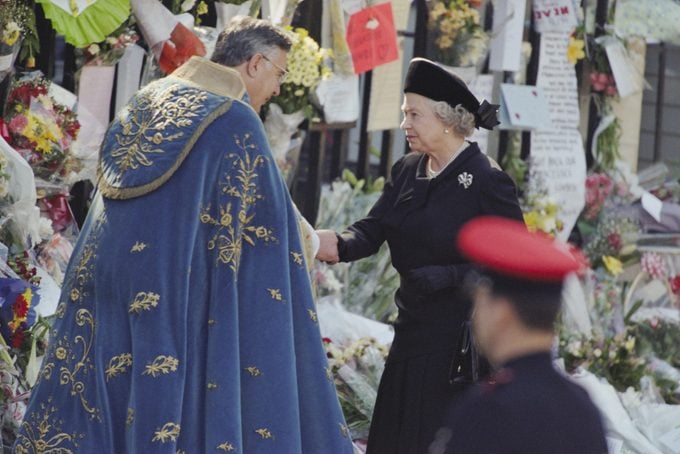
Perhaps the lowest point for the Queen throughout her seventy-twelvemonth-reign was after Diana was killed in the car crash, just one year after her divorce from Prince Charles. Instead of immediately rushing back to London from Balmoral to comfort her people, Elizabeth chose to stay in Scotland to attend to her grieving grandchildren, William and Harry, who had just lost their mother. The fact that Elizabeth remained in seclusion angered her subjects and fueled conspiracy theories nigh Diana'due south death.
"I think in private she probably was a much more than supportive ballast for that family in their menstruation of turmoil than she's given credit for," Chernock says. "This is just what I surmise, merely how telling is information technology that Meghan and Harry named their daughter [Lilibet] subsequently the Queen? Clearly, in that location's a really strong bond and love at that place, and she must take been a support to Harry during that actually difficult period effectually his mother'southward death."
Prince William echoed this in the BBC documentary,Diana, 7 Days. "At the time, y'all know, my grandmother wanted to protect her two grandsons, and my father likewise," he said, recalling being grateful to have had "the privacy to mourn, to collect our thoughts, and to just have that space abroad from everybody." William also said that Elizabeth "felt very torn between existence a grandmother to William and Harry and her Queen role."
A letter from Elizabeth to one of her aides recently resurfaced, revealing the Queen's personal feelings about Diana's passing. "Information technology was indeed dreadfully sad, and she is a huge loss to the state. Just the public reaction to her expiry and the service in the Abbey seem to have united people around the globe in a rather inspiring way. William and Harry have been so brave, and I am very proud of them," the Queen wrote. "I recollect your letter of the alphabet was 1 of the first I opened—emotions are still and so mixed upwardly, but we have all been through a very bad experience!"
A week after her death and the dark before Diana's funeral, the Queen came back to Buckingham Palace and made a rare live television voice communication almost the Princess; a landmark moment for her reign. Her broadcast, though, was "much at the urging of Tony Blair, prime minister at the time," Chernock says. "I recall she was counseled, just she was receptive to it, and saw that that was the wise movement, and she relented."
How did Princess Diana impact Queen Elizabeth and the monarchy?
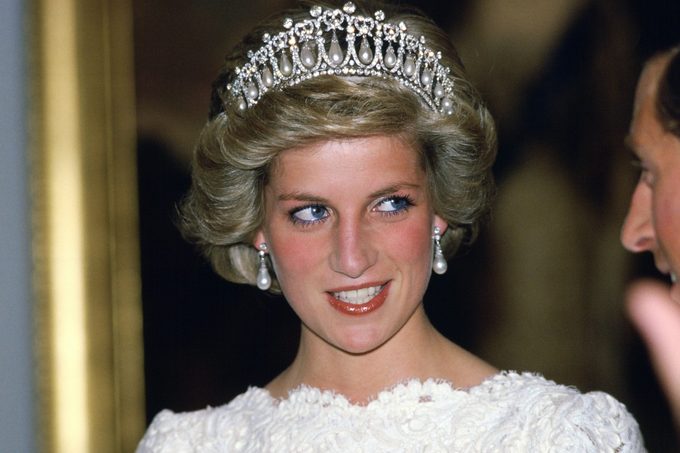
Diana's death was a turning point for the monarchy—and for Queen Elizabeth herself, who later adult a renewed connection with her people. "These are all lessons learned from the challenges of managing 'the Diana affair' and the fallout from that," Chernock says. "I call back it was a very challenging moment for the crown simply also indicative of the crown's resilience that they, and the Queen specifically, were able to weather that and gain new levels of popularity in the years later on, when many were predicting the end of monarchy in the late 1990s."
The Queen herself has changed as well, at to the lowest degree a bit. She's "trying to inject a little chip more than spontaneity, a little bit more emotion, a piddling fleck more connection into her delivery," Chernock says. "She has a very different fashion from Diana—and I don't think anyone would want her to be Diana—but she'southward become more than willing to bring some of her own personality into public."
In addition, "I call back she has developed a much finer appreciation for messaging, for showing that she'southward emotionally connected to her people and in touch, and trying to incorporate some informality, even though scripted, into her part," Chernock says.
Case in point: the opening ceremony of the 2012 London Olympics, in which the Queen performed in a James Bond skit. "That has Diana written all over information technology," Chernock says.
While her famous British "keep calm and carry on" attitude has helped the state withstand recent challenges—namely, a global pandemic—the Queen has also learned to adapt, even growing the imperial family's presence on social media. "I think the whole royal family unit, including Queen Elizabeth, took a lesson from Diana's formula that works," Chernock says. "The imperial family is ever trying to remainder tradition and innovation in a way that makes sense. In large part, I recollect this has to do with Diana and the fact that she was able to show that informality works."
Ironically, if things had gone differently, Queen Elizabeth and Princess Diana could have become a powerhouse team, working toward the same goals with their very different approaches. "I think that's part of the tragedy of information technology—there are and so many places where they could accept worked together," Chernock says. "There could have been convergence, and that never materialized."
As the Queen approaches her Platinum Jubilee, marker 70 years on the throne, she continues to face new challenges. Simply stronger with the lessons learned from Diana, she's equally popular as ever. "There take e'er been scandals in the family unit—challenges to overcome—and part of their success is their staying power, that they just go on to persist," Chernock says. "And and so, in her oldest age, the Queen has earned unprecedented respect for her commitment to staying the course."
Sources:
- Arianne Chernock, associate professor of history at Boston University
- The Royal Family official website: "Diana, Princess of Wales"
- Time: "Prince Charles Picks a Bride"
- The Queen & Di: The Untold Story, Ingrid Seward, 2002
- Diana: Her True Story—In Her Own Words, Andrew Morton, 1992
- The Guardian: "Diana tapes reveal Queen's respond to sobbing plea over loveless marriage"
- The New York Times: "Queen Urges Prince Charles and Diana to Divorce Soon"
- Diana, vii Days, BBC documentary, 2017
- ABC News: "Letter from Queen Elizabeth about Princess Diana's death comes to light"
Source: https://www.rd.com/article/queen-elizabeth-princess-diana-truth-relationship/
0 Response to "I ll Make You Queen Again Princess Diana"
Post a Comment